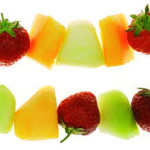 An athlete works harder than most people and burns more calories and energy. Because of this additional exertion on the body and increased need for energy there is some special consideration which must be addressed in the diet. An athlete’s needs, in terms of nutrition, are more than most and additional caloric intake is advisable to perform their best and build muscle.
An athlete works harder than most people and burns more calories and energy. Because of this additional exertion on the body and increased need for energy there is some special consideration which must be addressed in the diet. An athlete’s needs, in terms of nutrition, are more than most and additional caloric intake is advisable to perform their best and build muscle.
Because an athlete is usually expending more calories than they are eating, they should throw out the word “diet” and replace it with nutrition. While some athletes have specific weight restrictions or requirements, such as wrestlers, gymnasts and swimmers, they can usually meet those requirements by eating balanced healthy meals and supplementing with snacks as needed.
There are specific nutritional requirements that an athlete’s body will have to perform optimally.
Carbohydrates: Besides remembering that a well-balanced diet is essential, an athlete must also remember that carbohydrates create fuel. Without carbohydrates you will feel tired and weak. Whole-grain foods and vegetables are best and stay away from carbohydrates that are filled with sugar. These empty calories will not fuel the body’s performance. You really are what you eat!
Calcium: Calcium helps to build strong bones and teeth – but it is also necessary for muscle contraction and building strong muscles.
Minerals and vitamins: Eating lean red meats with the fat taken off is a good source of iron. You can also consume iron-enriched grains to supplement iron needs if you are a female athlete. There are a variety of other vitamins and minerals that are an essential part of a well-balanced diet and can be found in many fruits and vegetables. These vitamins and minerals are best received by the body in foods that are eaten raw.
 Fat: Stay away from saturated fats found in fatty meats and processed baked goods. But, your body does need fats to burn for energy and to protect your metabolism. Instead, eat unsaturated fats found in foods like avocados, almonds, peanut butter and olive oil.
Fat: Stay away from saturated fats found in fatty meats and processed baked goods. But, your body does need fats to burn for energy and to protect your metabolism. Instead, eat unsaturated fats found in foods like avocados, almonds, peanut butter and olive oil.
Protein: An athlete requires only a slight bit more protein than the average person does. Too much protein can actually reduce your performance and increase your weight. For an additional source of protein, you might want to try and eat eggs, dairy, nuts, peanut butter, and/or lean meats without the fat.
Other important factors in an athlete’s healthy diet are:
Water: Drink lots of it to reduce the potential to become dehydrated. You need to replace what you have lost through exercise to maintain good health. Sports drinks are good too and will replace some of your lost electrolytes and add carbs to your body system if you are working out for more than one hour. Less than one hour and you don’t lose enough electrolytes to benefit from the added calories. Soft drinks or anything carbonated could cause stomach upset. Caffeine depletes your fluid intake as it is a diuretic and can make you feel very anxious.
Before the big day:
Whatever you eat days prior to your event can play a role in your performance. It is important that you consider this factor when choosing your food intake. On the big day you should eat foods that are high in carbohydrates and low in fat. Protein should be eaten in moderate amounts.
Two to four hours before your event a meal that includes protein, carbohydrates and vegetables is advised as a performance enhancer.
Two hours or less before your athletic event should include a light snack.
One hour before the event should be saved for getting ready and avoiding eating all together. You might end up feeling too full to compete.
An athlete’s healthy diet involves careful planning for optimal energy and performance. As always, consult with your physician on issues involving your eating plans and the effects that they will have on your body.
Resources:
Colorado State University Extension: Nutrition for the Athlete
http://www.ext.colostate.edu/pubs/foodnut/09362.html
NewsMax: 10 Best Diet Tips for an Athlete
http://www.newsmax.com/FastFeatures/diet-tips-for-athletes/2010/11/09/id/371695
Kidshealth: A Guide to Eating for Sports
http://kidshealth.org/teen/food_fitness/sports/eatnrun.html
NHS Choices: An Olympic Athletes Diet
http://www.nhs.uk/Livewell/olympics/Pages/Athletediet.aspx
MedlinePlus: Nutrition and Athletic Performance
http://www.nlm.nih.gov/medlineplus/ency/article/002458.htm
Utah State University: Eating Healthy for Athletes
http://extension.usu.edu/files/publications/factsheet/pub__7049031.pdf
University of Minnesota: Helping Kids in Youth Sports Eat Better
http://www.sph.umn.edu/pdf/epi/research/HelpingKidsEatBetter.pdf


Leave a Reply